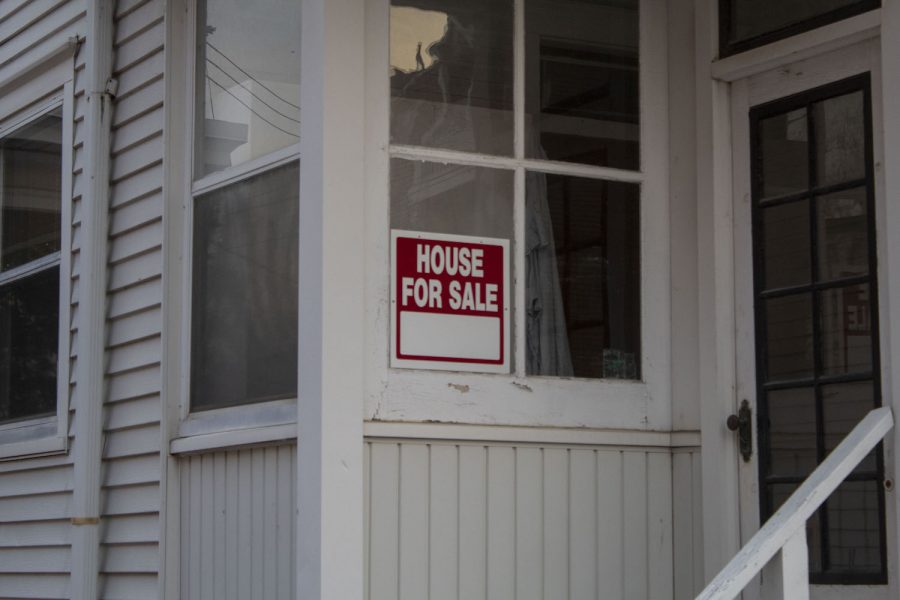Opinion | Rent is too high
Zoning and tax reform is what we need to fix housing.
A For Sale sign is seen on Nov. 17, 2020. With families wanting larger homes to inhabit while being stuck at home due to COVID-19, real estate companies are doing notably well.
April 19, 2021
Housing in Iowa could become unaffordable in the near future unless policymakers take the necessary steps to correct the current trends.
In the past four years, the median listing price in Iowa has increased from around $170,000 to nearly $232,000. This uptick in housing prices can be explained by an increase in demand for cheap housing and developers’ inability to keep up with that demand.
For this reason, if housing is going to remain affordable, policymakers on the local and state level need to enact zoning reforms and administer a land value tax.
In major Iowa cities such as Des Moines, developers are constrained by zoning laws which regulate where they can build certain types of houses.
These laws are a product of the 1950s when families were looking to move out of chaotic cities and live in large, single family homes.
From an economic standpoint, these exclusionary zoning laws prove to be problematic as they put an artificial constraint on supply. Compared to townhouses, condos, and apartments, single family houses are much larger so developers cannot build as many units thus leading to an appreciation of housing prices.
To deal with this problem, policymakers must relax zoning codes and allow the construction of multi-family dwellings in areas once reserved for single family housing.
By building housing that allows more people to live in a particular neighborhood, the aforementioned supply constraint is solved for as home builders will be able to keep up with demand.
The economic theory is confirmed by empirical analysis as studies contextualize that building more homes increases affordability in the housing market.
The idea of zoning reform has met some fierce backlash particularly from those skeptical of market solutions. These critics argue relaxing zoning reforms will not increase housing affordability. Instead, building more housing will just increase the demand of housing thus leading to no change in housing prices.
Alternatively, they advocate for an effective price ceiling, as they believe this will directly cheapen housing and increase home ownership.
First, the idea that price ceilings such as rent controls increase home ownership is counter intuitive.
Price ceilings benefit current homeowners while disincentivizing developers from building new housing thus hurting prospective homeowners as there will be no homes for them to buy.
Second, study after study emphasizes if you increase the amount of housing in a neighborhood, then the price of housing decreases. In fact, for every 10 percent increase in the housing stock, rents decrease by 1 percent.
Next, policy makers should concoct an effective tax scheme to help increase the amount of affordable housing.
In order to accelerate the development of housing in expensive neighborhoods, a land value tax must be put in place. While similar to a property tax, a land value tax functions differently in that it charges a high tax rate on underused land.
This idea of taxing land applies directly to increasing housing supply as it incentivizes landowners to build multi-family units. That way, the land tax can be spread out to multiple families instead of the landowners.
If policymakers do not take the necessary reforms to deal with the rising costs of housing, Iowa could potentially face the problems that states such as California and New York are dealing with right now.
High housing costs have proven to be a burden as people do not want to live in expensive states. If Iowa wants to keep its reputation as a pro-growth state, state and local lawmakers need to implement pro-housing policies.
Columns reflect the opinions of the authors and are not necessarily those of the Editorial Board, The Daily Iowan, or other organizations in which the author may be involved.















